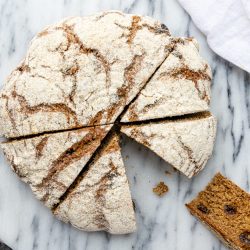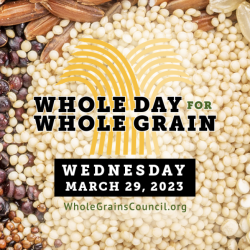They say don’t meet your heroes. But I highly recommend it. I have told everyone who will listen that meeting Dr. Stephen Jones was the highlight of my life, thus far. I have been a big fan of his work since learning about him last year, so when we invited him to Zingerman’s Bakehouse as a guest speaker in our Brown Bag Lecture Series at BAKE!, I volunteered to be his tour guide and chauffeur for one day of his visit. We visited the Zingerman’s Southside businesses, took tours at Cornman Farms and Mail Order, had lunch at the Roadhouse, and he spoke at BAKE! that evening.
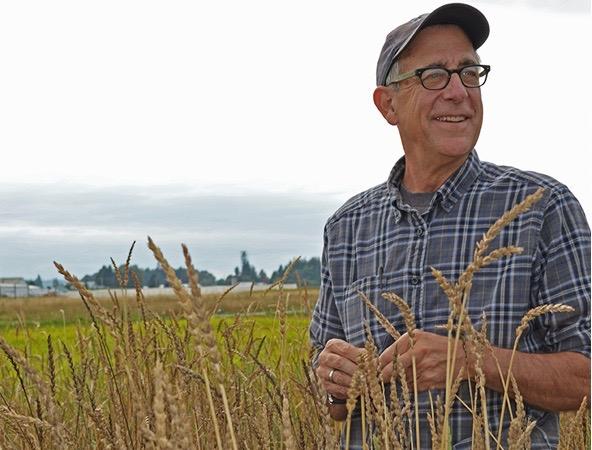
Jones is a plant geneticist at Washington State University, where his research focuses on wheat breeding. He also serves as a professor in the Department of Crop and Soil Sciences and as the director of The Bread Lab. Stephen is well known in academia and industry alike for being an expert in his field; is credentialed by degrees, professional experience, and the status of tenure; and is well funded by an endowed fellowship—he’s basically the textbook picture of success as a scientist. Stephen, though, is much more than a successful scientist. Particularly through his work at The Bread Lab, Stephen provides a model for food systems transformation, inspiration to scientists looking to serve their communities, and a technical framework for biological research that supports local economies. Perhaps most impressively, in his work Stephen tells a beautiful story that can help us move from industrial, commodity agriculture, which dominates our food systems today, to less centralized food webs that are refocused farming for just that, food.
When I picked him up, we bypassed small talk, did not pass go, and immediately began deconstructing the role of hubs like The Bread Lab in scaling out agroecological farming and the role of businesses, like Zingerman’s, in making these hubs as functional as possible.
A cool 15 minutes and a PhD thesis’ worth of theories to test later, we met up with Amy Emberling, managing partner of the Bakehouse, who toured Stephen around our facilities. We wound our way through the Bakehouse, from pastry scaling to the cake department and pastry production, ending up at our new mill, where we connected with baker and grain nerd, Hazim Tugun. You haven’t toured the Bakehouse until you’ve got the tell-tale flour on your nose from smelling our freshly milled flour. Stephen pulled each close to his face, hovering them right under his glasses. As part of this ceremonious meeting of our grains, Stephen was holding a handful of Molly Breslin’s rye and pointed out that the rye grains were relatively small, signaling to him that they were bred with cover cropping in mind, not food. Tiny rye kernels aren’t inherently a problem; they just mean there is room for improvement. With selective breeding, the farmer could get more out of her plants and we could get more out of the resulting grains of rye. This exemplifies Stephen’s overarching goal—arriving at improved grain lines by breeding for food, and breeding for farmers, rather than breeding for agriculture and for commodity traders.
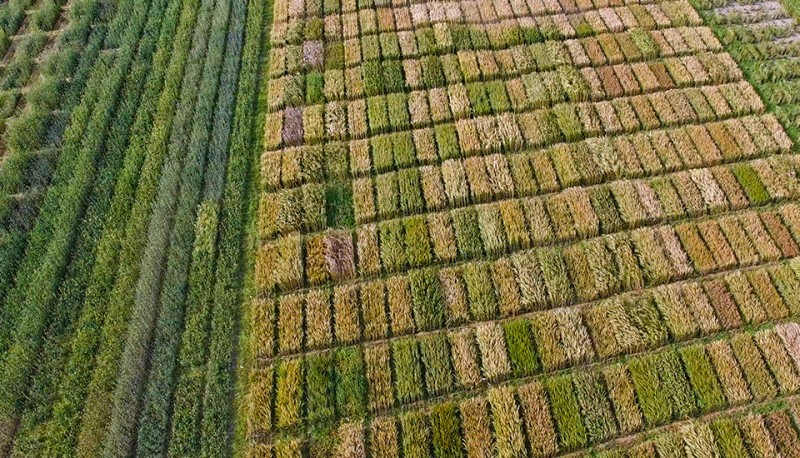
Stephen is so good at breeding for food precisely because he spent decades breeding for commodity systems. He saw what was being lost because of the commodity approach, which is characterized by yield at all costs, reliance on agrochemicals, loss of farmer agency over seed saving and grain price setting, and the bleeding of grains’ value from local and regional food systems. Stephen grew tired of supporting this system. So, he decided to take back grains as a food and to take back science as a means of supporting farmers instead of big business. This cost him his role as commodity wheat breeder and the six-figure salary that went with it. Washington State University is very invested in supporting agriculture that supports big business, as is the case with most land-grant schools.
Stephen describes himself as a terrible businessman because he does not patent any of his grain varieties and gives the seed away for free. Good for food justice, bad for profit. This approach is just one of the many things that distinguishes Stephen’s research from that conducted by companies like Monsanto (Bayer). Another point worth clarifying is that Stephen doesn’t engineer transgenic grains; he just uses human selection (much like natural selection) to breed for desired traits. Basically, he impacts the grains’ DNA like evolution would in the wild, not like Monsanto does via techniques like gene splicing in a laboratory; just good old fashioned plant reproduction.
Over fried chicken and mashed potatoes at the Roadhouse, Stephen recalled other noteworthy visitors he’s hosted and trips he’s been able to take as the Bread Lab has captured more attention internationally. He has been visited by Yvonne Chaunard and Bill Gates, and been a guest at the White House and in the home of the owner of Bruichladdich Scotch. The famous distillery requires its barley to be sourced exclusively from the little island of Islay, Scotland. The challenging nature of sufficient barley production on a tiny island is how an American geneticist ends up sipping Scotch from a CEO’s personal collection on the Hebridean isle—in order to consult on how to effectively grow Islay barley production in ways that don’t sacrifice quality or sustainability. This is one of the things I find most refreshing about Stephen’s approach: in a world full of incredibly polarized and polarizing discourse, he eschews the idea of all or nothing and breeds for yield, but never “yield at all costs.” Today’s media avoids dealing with complexity that accurately reflects reality, I believe, because they think dichotomies are more sensational and attention-grabbing. In turn, they’ve trained us to deal less in complexities in our work, our eating, and our decision making as well.
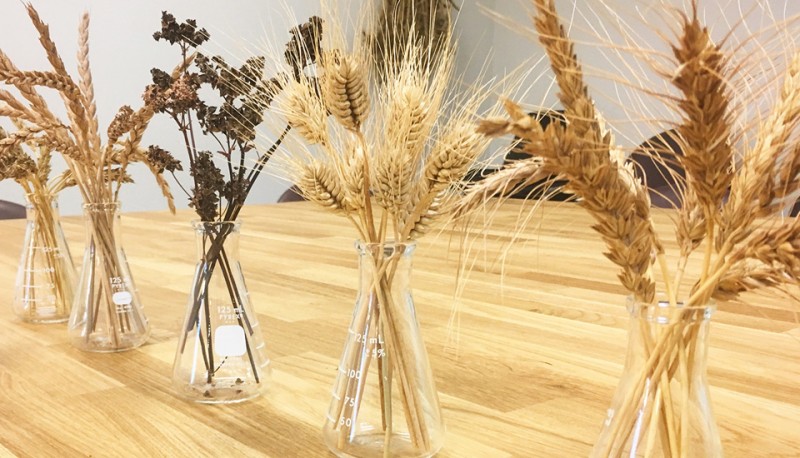
The way Stephen has captivated both some of the most powerful people, the companies and institutions they represent, and his rural community in Northwest Washington, betrays a global capacity and readiness to deal with complex co-goals and nuanced solutions. We see what is working, what centralization and agronomy and land grants have provided, and what they have taken that we want back. Stephen invites us to retrace our steps and stop at the peak of the optimization curve, not return all the way back to the starting point. Stephen uses his own archetypal hero’s journey to tell a story about wheat breeding that complicates the middle ground. In ecology, another way to think of complexity is diversity, and another way to conceptualize an ecosystem’s diversity is its richness, a richness that can support a whole movement from consuming globalized agriculture to eating regional food.
I left the Roadhouse, after lunch, toying with the idea that another favorite scientist of mine, Helda Morales, would probably term the storytelling that Stephen weaves his work together with a type of “mobilizing discourse.” Mobilization was exactly what I saw at our informal community coffee date later that afternoon at the Coffee Company. In attendance were bakers, farm owners and managers, maltsters, grain brokers, and grocery store owners, all from the Ann Arbor area. When asked by the group about his vision for change, Stephen emphasized his desire to spend his time and energy creating an alternative food system, rather than fighting the powerful players that perpetuate the broken one we find ourselves in. Early in his career, his strategy included more direct opposition to Monsanto, an approach he didn’t find effective, saying, “I stormed their gates with a torch in hand and when I turned around, no one was behind me.” Instead of fighting, he now focuses on providing an alternative breeding program and seed source and allows people to come to him. He explained to us that Monsanto and other large corporations are built to fight, and he just isn’t. He doesn’t care to fight for changes in corporations, or in government, or even to be heard. In an ultimate demonstration of the power of this philosophy, his current major funding sources have all approached him instead of him going to them. Stephen also emphasized his belief that each region should be well supported by public servants, like himself, that can link grain growers and grain end users with the resources and information these relationships need to be successful.
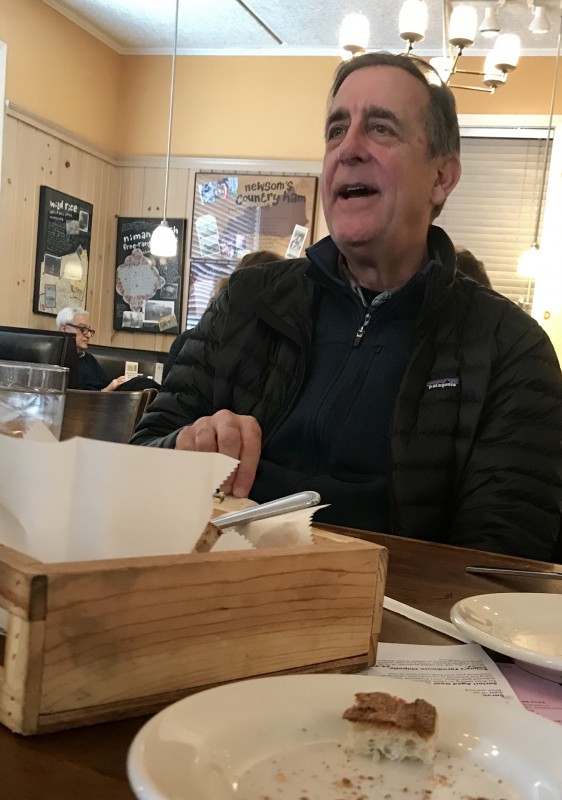
Environmental and socioeconomic conditions are different here in Michigan than in Washington, and though The Bread Lab provides great proof of principle, we need our own context-specific data and seed to be truly successful. To this end, the Bakehouse is partnering with master’s students at the University of Michigan and Nature Nurtures Farm to set up Bread Lab-inspired research that will help farmers and bakers better select grains that meet everyone’s goals.
After coffee came the main event: Stephen’s presentation on local grain economies. What struck me most about his talk was its focus on beauty. This was surprising to hear as was his reference to one of his PhD student’s thesis chapter called, “The Sound of Wheat,” and the fact that he ended the talk with an image of a Chagall painting. Maybe this kind of tenderness towards your work is what is possible when you spend your time building instead of fighting.
The night before his talk, over dinner at Miss Kim’s, Stephen divulged that his favorite grain was buckwheat. When asked why, he told us that he is fascinated by the perception of the plant globally—in some cultures it is stigmatized as a food for the lower classes while in others it is traditionally featured at royal weddings. He explained that it is often planted as an emergency crop and is beloved by starving bees in late summer. He names his wheat lines with the same careful, yet almost whimsical, consideration. His is a consideration that acknowledges the chance to add a layer of meaning, of poetry, and he does so with joyful reverence. The first wheat he ever named he called Xerpha, after a former botanist at WSU who cataloged plant species that would be lost by the flooding caused from building dams, loss caused by progress. Stephen came to know about her when a photo of her in her wedding dress fell out of a book he was referencing. A fitting woman to honor in his own quest to understand what we’ve lost in the name of progress at any cost.
Our visit with Stephen brought into focus, for us, what a more robust grain economy could look like here in southeast Michigan, the philosophical and scientific frameworks that might best guide how we get there, and who we still need to bring to the table to see real and lasting changes. This is a journey we’d already begun at the Bakehouse, long before my arrival, and that we are committed to continuing. In a kind of beautiful balance, this far-away friendship with Jones gives us the solidarity and modeling that allows us to take the next step in deepening the community right in our own Midwestern backyard, to move from sourcing that relies on big, globalized companies to big networks of cooperation and connection that unite us all.
By Hailey Schurr
Bakehouse Sourcer-ess
Photo credits: The Bread Lab (1-3), Sara Hudson (4)
Bakehouse Sourcer-ess
